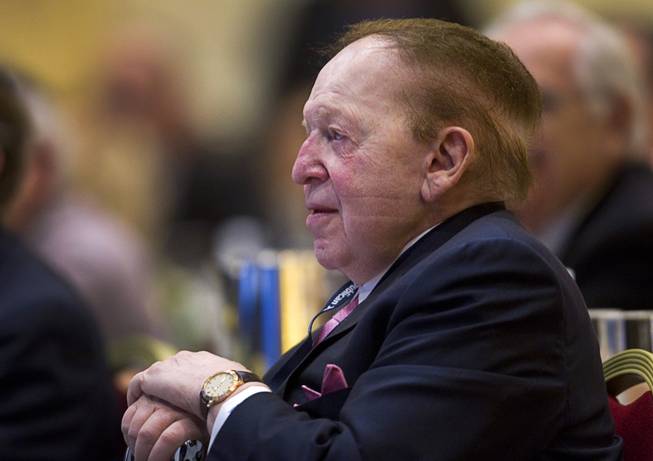
Sheldon Adelson, chairman of the board and CEO of Las Vegas Sands Corp., listens to New Jersey Gov. Chris Christie during the Republican Jewish Coalition Spring Leadership Meeting at the Venetian on Saturday, March 29, 2014.
Tuesday, May 6, 2014 | 2 a.m.
When most people think of Sheldon Adelson, they usually think of the billions he’s made off gamblers and conventioneers. They think of his luxury Las Vegas casinos, his right-wing politics, his heavy investments in Macau.
Odds are, they don’t think of him as a moral savior who wants to protect the poor — but Adelson sure seems to.
The 80-year-old casino mogul and Republican mega-donor described himself Monday as “socially sensitive” for wanting to ban online gambling, saying it’s a “moral issue,” not a financial one.
To a crowd of hundreds of students at UNLV, Adelson, CEO of Las Vegas Sands Corp., owner of the Venetian and the Palazzo, depicted a world where online gambling permeates cellphones and computers across the nation.
He said that when he was growing up in the slums of Boston, he and his three siblings slept on the floor in the same bedroom as their parents. But their Lithuanian-immigrant father, who had only a sixth-grade education, spent his earnings as a taxi driver at racetracks.
A casino in every kitchen or on every cellphone, Adelson said, amounts to preying on people who can least afford it.
“I see what exploitation of poor, vulnerable people does to a family,” he said. “I was part of it.”
Adelson, with almost $39 billion to his name, is the eighth-wealthiest person in the world, according to Forbes magazine. He is bankrolling the Coalition to Stop Internet Gaming, a nonprofit group that’s pushing Congress to outlaw the business in part by overriding states that have legalized it.
Critics say he’s backing the ban to protect his casinos in Las Vegas and Asia. But he rejected that claim Monday, saying, without elaborating, that he was “not worried about money going away” from his properties.
“I am in favor of gambling,” he said. “I am in favor of it as a form of entertainment. But I am not in favor of it exploiting the world’s most vulnerable people. I know I am a Republican and I am not supposed to be socially sensitive, but I am very socially sensitive.”
Also Monday, after a question from an audience member, Adelson weighed in on the Israeli-Palestinian conflict, another favorite topic. Adelson is a hard-line supporter of Israel and has called a future, possible Palestinian state “a stepping-stone for the destruction of Israel and the Jewish people.”
Asked why he feels Palestinians should not have their own sovereign country, he said the conflict there is a religious one, and that Palestinians have “no legitimate connection” to the land.
“There’s no such history as a Palestinian people,” he said.
The UNLV event, hosted by the college of hotel administration, featured hourlong discussions with Adelson and, before him, Michael Leven, president and chief operating officer of Las Vegas Sands.
They spoke one-on-one with Arte Nathan, a visiting lecturer at the hotel college and a former human-resources executive at Wynn Resorts, who described Monday’s discussions as “conversations on being successful.”
The event came a month after UNLV announced a $7 million gift from Las Vegas Sands to help construct an academic building for the hotel college and “boost executive education opportunities” through a proposed Center for International Hospitality and Gaming Education.
Nathan lobbed mostly softball questions at the executives, asking how they handle disappointment, if they brainstorm with subordinates, how they react when others disagree with them, how people should prepare for meetings with them, and which word they and others use to describe them. (Adelson and Leven both said that people view them as a “mensch,” Yiddish for an honorable and upstanding person.)
Adelson was not made available for interviews after his time onstage, but Leven was, and he spoke with reporters about, among other things, his company’s ongoing push into Asia.
Las Vegas Sands already owns casinos in Macau and Singapore, but South Korea and Japan are “the two major targets for us at the moment,” Leven said.
His company has launched advertisements in Japan, hired personnel there and plans to open an office in that country. Casino resorts are not yet legalized in Japan, but Adelson said a few months ago that he would consider spending $10 billion to build a casino there.
Caesars Entertainment Corp. and Wynn Resorts also have been eyeing the country.

Join the Discussion:
Check this out for a full explanation of our conversion to the LiveFyre commenting system and instructions on how to sign up for an account.
Full comments policy